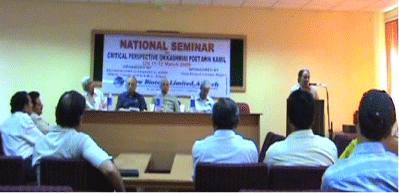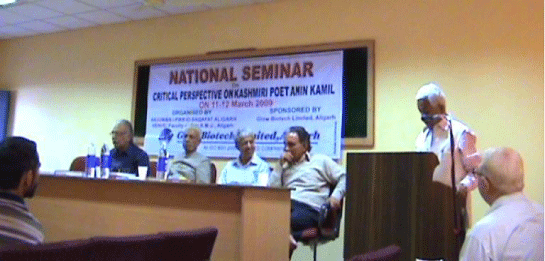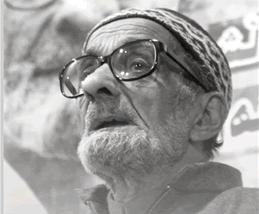Introduction
Emerson’s famous words, ‘whosoever is a great man is a non –conformist’, fit so well with Amin Kamil. Six years ago, this major voice in Kashmir poetry and one of the chief exponents of modern Ghazal, whose contemporaries and later generations widely accepted his influence, passed away at the age of 90.
Read: Famous poet & writer Amin Kamil passes away
Being a public servant at University one comes across a cross-section of intellectuals, writers, and academics whom you love to hear. I have heard Kamil at several literary events held at Kashmir University. One could not miss his genius and originality of thought over issues of contemporary relevance. Sometimes you could disagree with him at the most, but never afford to ignore him or be indifferent to his utterances.
Background
“A thought-provoking intellectual who would challenge all the forms and styles in prose and poetry, and focused himself on Kashmir specific research”, is how Faruq Masudi, a writer, and filmmaker, describes his ‘unconventional’ way of ‘doing’. The road he treads on the landscape of Kashmiri language and literature was the one less traveled, Faruq said. And that for great literary genius Robert Frost “makes the difference”.
Born in Kapran Kulgam, a village in south Kashmir, on 3rd August 1924, Kamil moved to Srinagar at a very young age; graduated in Arts from the Punjab University and later took a degree in law from the AMU, Aligarh. In 1947, he joined the Bar and practiced law until Sri Pratap College, Srinagar appointed him as a lecturer in 1949. Amin Kamil remained closely associated with the writers’ movement of that era and under its influence switched over from Urdu to Kashmiri as his medium of expression.
In 1958, the State Cultural Academy, when established, enlisted him as a member, and he assumed the role of the convener for Kashmiri. Kamil later became Editor for the Kashmiri section and edited the two journals of the Academy for many years.
Down to memory lane
Recalling Kamil’s days as editor Sheeraza, the poet critic and translator of Kashmir languages Muneeb-ur-Rehman, one of his old blogs describes Kamil as “an editor par excellence”. “Kamil would value and respond to all forms of literature – new and old with equal interest and treatment. His unprejudiced outlook on all genres and styles culminated in the popularity of Shiraza among a cross-section of Kashmiri writers, recalls Muneeb. Kamil was instrumental in fashioning Kashmiri Ghazal into an entity distinct from its Urdu and Persian counterparts.
Freshness of sensibility, maturity of expression, and striking technical innovation collectively characterize his poetry, granting him a uniquely distinctive diction.
Ninder chi tosi katan wajnaen paemitch kar taam
Amin Kamil
Yinder chu toti nachaan intizaar paghuk kar
Wheel spinners have long slept
Translated by Showkat Shafi
But the wheel will continue to move on,
Wait for tomorrow.
Humor
Kamil employs subtle humor and satire with devastating effect in his poetry. Through it, he mirrors contemporary life and makes a social comment on his milieu. His satire or humor, however, does not bruise but heals.
“Yeti chu soroei fiza Karamaech hund ,
Amin Kamil
Yeti chi prath mehkamus chalawaan laash
With us miracles are quite common,
Translated by Unknown
everywhere the dead rule the living
He has the quality of being simple as well as profound at the same time. This he does in purely Kashmiri tenor. Despite his great academic knowledge, he has never fallen prey to the transplantation of an alien metaphor, borrowing of a foreign concept or trend in literature. His use of language is exceptional in the literary history of Kashmir. Kamil’s contribution to the field of fiction adds to his stature. In 1958, Gati Manz Gaash (Light Amidst Darkness), a novel written in the context of the aftermath of the partition of the Indian sub-continent in 1947, won him acclaim. Kamil’s collection of short stories, Kathi Manz Kath (Story Within Story) published in the mid-60s includes his masterpiece, Kokar Jang (The Cockfight).
The Cockfight is considered the most popular story in Kashmiri literature. It has been translated into many Indian languages and has appeared in anthologies such as Indian Short Stories Contemporary, Kashmiri Short Stories, and Contemporary Indian Short Stories. It has also appeared in Best Loved Indian Stories of the Century, published by Penguin India in 1999. Kamil like many great writers the world over believed humor and satire as “effective weapons for social change”. His wonderful compilation Asan Trayi is a great example of satire and humor. Kamil also established himself as a creative prose writer and critic. His great contribution is the publication of Kashmiri Sufi Poetry (3 volumes ) and revisiting the traditional Habakatoon and presenting a fresh and “vivid” picture of this great historical character.
Amin Kamil as editor
Apart from some anthologies he edited, Kamil has published two books of literary criticism Jawaban Chu Arz (In Reply, vol 1 & 2) and a book Mehjoornen Bonen Tal (Under the Chinars of Mehjoor) on the popular Kashmiri poet of the 1930s, Ghulam Ahmad Mehjoor. A great lover of the Kashmiri language Kamil’s dictum, ”Kashri saeten Kashir sairi” ( Kashmiris are because of the Kashmiri language) remained close to his heart all his life. ‘Can we just be ourselves, pledge not to copy whether in thought or diction and reap the benefits of this rich language’, he was often quoted as saying.
Naerow, Manzil Chi warah door paek,
Amin Kamil
Yemi chi sayri kochi bay gul nor paek
let us move, the goal is yet too far,
Translated by Unknown
All these lanes are devoid of flowers, move on
A Two-day national seminar at Aligarh Muslim University Aligarh held in early 2009 on “Critical Perspective on Kashmiri Poet Amin Kamil” looked at the genius of Kamil from many angles. In the seminar, Professor Gulshan Majeed, a noted writer, and critic revealed that Kamil’s use of words is oriented toward liberating us from the prison-house of systems, ideologies, and meta-narratives. Prof Majeed added that “Kamil employs metaphors and paradoxes intending to transcend the normal parameters of the communicability”


Read: Two-day National Seminar on Amin Kamil at AMU
What others say about Amin Kamil
Besides his recognition at the national level, Kamil had little share as yet at the international level. Language for a New Century — Contemporary Poetry from the Middle East, Asia & Beyond, an anthology of Eastern poetry published by a renowned international publisher W.W. Norton & Co., for the first time included poems by many Kashmiri poets.
The anthology included poems by Kashmiri poets Amin Kamil, Rehman Rahi, and Rafiq Raaz. Muneebur Rahman says ‘It’s for the first time that Kashmiri poets are featured in an international anthology,” said Muneeb to a local English daily. “The anthology includes poems from about 60 nationalities, wildly divergent cultures and voices.” Translations of Amin Kamil’s Ghazals, Dew, and Water which appeared in the anthology were also part of an international workshop held in Chicago, sponsored by the University of Chicago. Poet and editor Ravi Shankar of Central Connecticut State University also conducted a discussion of works by Korean poet Ko Un, Chinese poet Bei Dao, Japanese poet Tada Chimako, and Kashmiri poet Amin Kamil among four other poets from the Middle East.
“A writer exists on three planes—the plane of relationships, the plane of social ties, and the plane of individuality, and he or she can’t do away with any of these”. Kamil was quoted as saying by a local English daily 7 years back. And this is all true about Kamil himself.
Poetry for Kamil is the art of giving meaning and metaphoric value to words and situations. “I can say that literature is an indirect art”, he had said.
